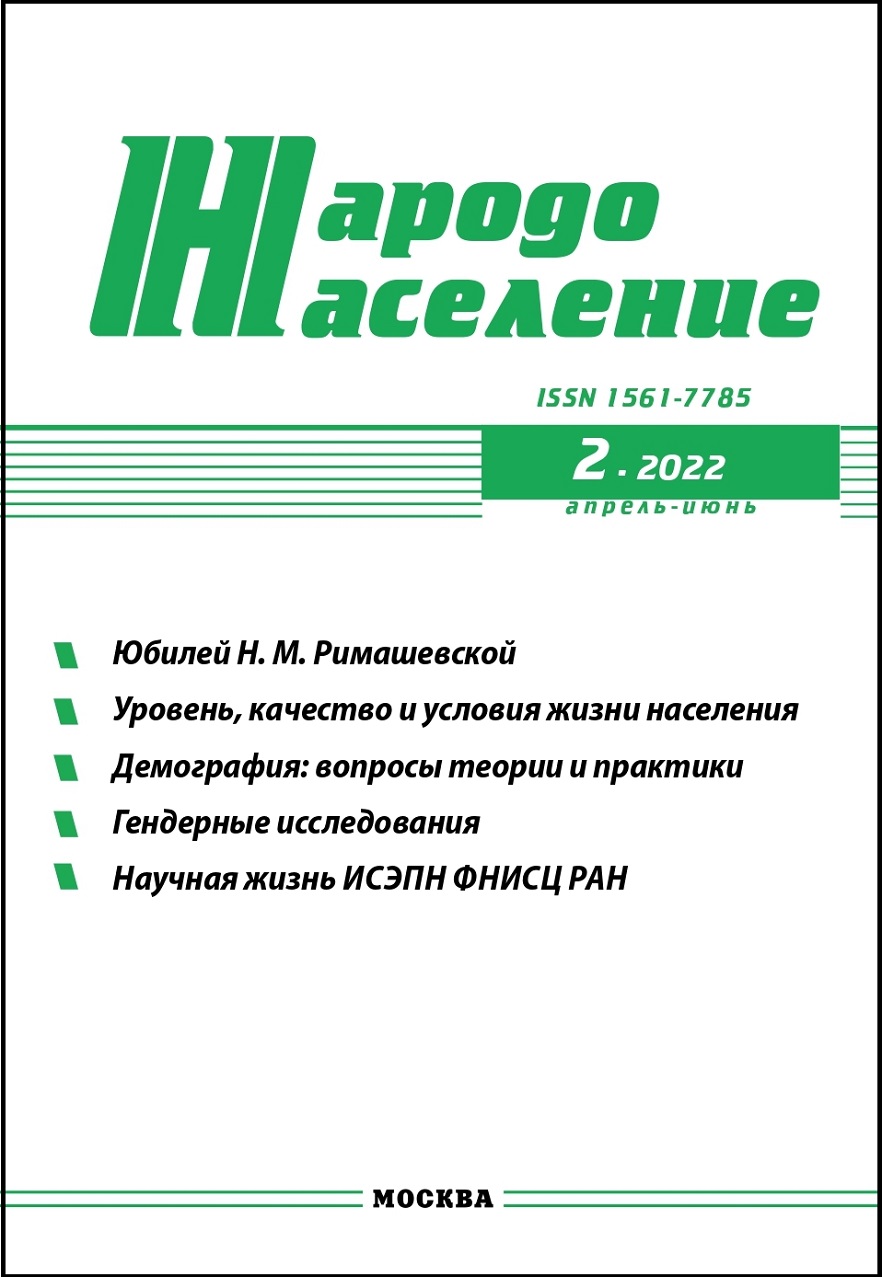Тренд на устойчивое развитие как фактор снижения гендерного неравенства в России
Научная статья
Выражение признательности
Исследование выполнено в рамках НИР по Государственному заданию «Гендерные аспекты социально-экономической динамики современной России» № 0165-2019-0011.
Для цитирования
Хоткина З. А. Тренд на устойчивое развитие как фактор снижения гендерного неравенства в России // Народонаселение. 2022. Том 25. № 2. С. 142-152. DOI: https://doi.org/10.19181/population.2022.25.2.12
Аннотация
«Пандемией неравенства» был назван C0VID-19, приведший к обострению различных видов неравенства, включая гендерное. Пандемия актуализировала вопрос поиска новых путей и возможностей улучшения ситуации с гендерным равенством и в России. В статье представлен результат анализа российских отчётов за период 2016-2020 гг. по выполнению «Повестки дня в области устойчивого развития на период до 2030 года». Страновые отчёты анализировались только по пятой Цели устойчивого развития ООН (ЦУР), направленной на «Обеспечение гендерного равенства». Новизна авторского подхода к анализу отчётов состоит в том, что использованная в них система показателей для достижения к 2030 г. пятой ЦУР рассматривалась в качестве факторов продвижения к гендерному равенству в стране. В 2020 г. Россия представила в ООН два доклада с отчётами по достижению ЦУР — правительственный и гражданский, то есть составленный общественными организациями. Результаты краткого сравнительного анализа правительственного и гражданского отчётов показали разительные отличия между ними: бюрократический формализм первого и конструктивный характер второго. Это свидетельствует о том, что именно гражданское общество осознает остроту и актуальность проблем гендерного неравенства в России и готово их решать. Содержание отчёта и рекомендаций, обращённых гражданским обществом к государству, указывает на то, что выполнение целевых показателей ЦУР может служить важными фактором в деле продвижения страны к гендерному равенству. В то же время из анализа формы и содержания правительственного отчёта становится очевидным, что гендерная повестка не относятся к числу приоритетных направлений современной российской социальной политики.
Ключевые слова:
Цели устойчивого развития ООН, гендерное равенство, статистические показатели, международные документы, страновые отчёты
Литература
1. Римашевская, Н.М. Человек и реформы: секреты выживания / Н. М. Римашевская. — Москва : РИЦ ИСЭПН РАН, 2003. — С. 271-342.
2. Наше общее будущее. Доклад Международной комиссии по окружающей среде и развитию (МКОСР) / ред. С. А. Евтеев и Р. А. Перелет. — URL: https://docs.yandex.ru/docs/view (дата обращения: 03.02.2022).
3. Stiglitz, J. Report by the Commission on the Measurement of Economic Performance and Social Progress / J. Stiglitz, A. Sen, J. — P. Fitoussi. — URL: www.stiglitz-sen-fitoussi.fr. (дата обращения: 04.02.2022).
4. Стиглиц, Д. Неверно оценивая нашу жизнь: Почему ВВП не имеет смысла? Доклад Комиссии по измерению эффективности экономики и социального прогресса. Пер. с англ. И. Кушнаревой; науч. ред. перевода Т. Дробышевская / Д. Стиглиц, А. Сен, Ж.—П. Фитусси. — Москва : Изд-во Института Гайдара, 2016. — 216 с.
5. Плато, К. Два года спустя после доклада комиссии Стиглица-Сена-Фитусси: что нового в статистическом измерении благосостояния и устойчивого развития общества? / К. Плато // Вопросы статистики. — 2011. — № 11. — С. 3-11.
2. Наше общее будущее. Доклад Международной комиссии по окружающей среде и развитию (МКОСР) / ред. С. А. Евтеев и Р. А. Перелет. — URL: https://docs.yandex.ru/docs/view (дата обращения: 03.02.2022).
3. Stiglitz, J. Report by the Commission on the Measurement of Economic Performance and Social Progress / J. Stiglitz, A. Sen, J. — P. Fitoussi. — URL: www.stiglitz-sen-fitoussi.fr. (дата обращения: 04.02.2022).
4. Стиглиц, Д. Неверно оценивая нашу жизнь: Почему ВВП не имеет смысла? Доклад Комиссии по измерению эффективности экономики и социального прогресса. Пер. с англ. И. Кушнаревой; науч. ред. перевода Т. Дробышевская / Д. Стиглиц, А. Сен, Ж.—П. Фитусси. — Москва : Изд-во Института Гайдара, 2016. — 216 с.
5. Плато, К. Два года спустя после доклада комиссии Стиглица-Сена-Фитусси: что нового в статистическом измерении благосостояния и устойчивого развития общества? / К. Плато // Вопросы статистики. — 2011. — № 11. — С. 3-11.
Статья
Поступила: 01.03.2022
Опубликована: 10.06.2022
Форматы цитирования
Другие форматы цитирования:
APA
Хоткина, З. А. (2022). Тренд на устойчивое развитие как фактор снижения гендерного неравенства в России. Народонаселение, 25(2), 142-152. https://doi.org/10.19181/population.2022.25.2.12
Раздел
ГЕНДЕРНЫЕ ИССЛЕДОВАНИЯ








